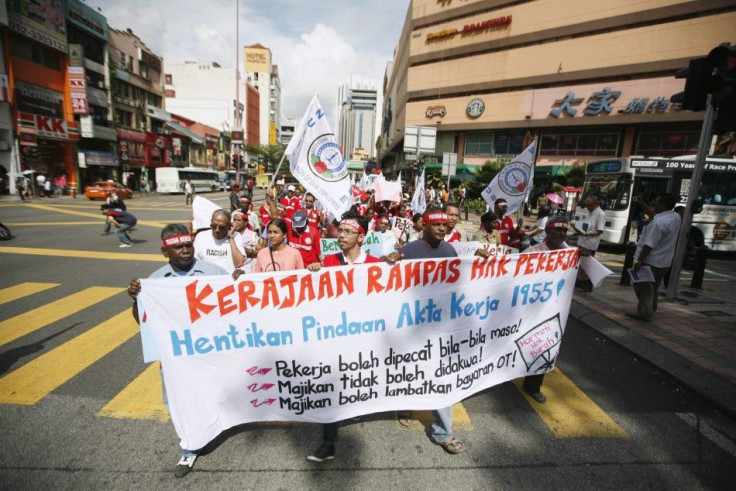May Day: Malaysia Introduces Minimum Wage, But Not Everyone Is Pleased
ANALYSIS

In accordance with global May Day celebrations, the southeast Asian nation of Malaysia has introduced a minimum wage for the first time, following a decade of pressure by labor unions.
The introduction of the minimum wage is a historic moment for Malaysia, said Prime Minister Najib Bin Abdul Razak, who is seeking the support of the poor and working classes.
The lowest-paid will now be guaranteed an income that lifts them out of poverty and helps ensure that they can meet the rising cost of living.
Under terms of the new law, workers in Malaysia’s private sector will get a minimum salary of 900 ringgit ($297) per month, while laborers in the poorer, outlying states of Sabah and Sarawak on the island of Borneo will receive 800 ringgit ($264) monthly.
Businesses will have up to one year to adjust to the new payment system.
The Kuala Lumpur government estimates that about one-third of Malaysian workers (34 percent) earned less than 700 ringgit per month as recently as 2009, meaning that the new wage scheme will lift many of them out of poverty.
But some critics complain that the minimum wage will hurt small business owners and the country’s competitiveness.
Shamsuddin Bardan, director of the Malaysian Employers' Federation, told BBC: The 900-ringgit level is too high for those in small towns and remote villages, adding that wages in places like Sabah and Sarawak could climb by as much as 90 percent, thereby increasing the cost of doing business.
We feel the situation will be better managed if wages are linked to productivity and skills of employees,” he added.
The opposition Democratic Action Party (DAP) has also criticized the minimum wage law, according to the Malaysian Insider.
Lim Guan Eng, the party’s secretary-general, said the measure by itself will not raise standards of living nor promote economic growth unless it is accompanied by structural reforms. He also called for the country’s economy to become more competitive, transparent and efficient, with a concomitant reduction in corruption.
He also called for swift reforms in the education system.
Unless we can inject merit and performance back into our education system, Malaysia risks being left behind by neighboring countries such as Thailand, Indonesia and Vietnam,” he said.
Daniel Martin, Asia Economist at Capital Economics in London, said the new policy will concurrently ease poverty in Malaysia, while squeezing the profit margins of companies, thereby pushing up inflation.
“Is not a free lunch,” Martin cautioned. “Minimum wages can end up pricing some workers out of the market. Businesses will not hire a worker unless it is profitable to do so, and some workers will not be productive enough to justify the new wage rate.”
Unemployment (which amounted to 3.2 percent as of February according to government statistics), Martin warns, could also rise as a result of the minimum wage.
“Some workers will see their wages increase, but others will find it more difficult to get a formal-sector job,” he said.
Martin points out that the new wage policy seems to be inspired by Najib’s political motivations.
The next election is not scheduled until March 2013, however Najib may call a new poll as soon as June 2012. His government has already passed a series of other vote-inducing measures, including a hike in the salaries of public employees
Malaysia is currently classified as an “upper middle-income” economy by the World Bank, with a mandate to reach “high income” status by 2020.
To achieve such a lofty level, the World Bank said that Malaysia will need “better skills, more competition, a leaner public sector, a better knowledge base, smarter cities, and greater efforts to ensure environmental sustainability.”
A new minimum wage may derail progress on that front.
But Malaysia is hardly the only Asian nation increasing the minimum wage. Thailand, Taiwan and Vietnam have already passed or plan to implement significant increases in the minimum wage.
© Copyright IBTimes 2025. All rights reserved.





















